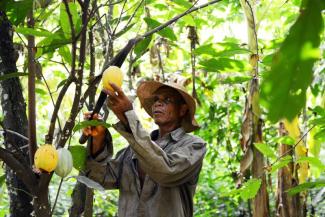Fair trade
A drop in prices is hurting cocoa farmers

Small farms in Côte d’Ivoire and Ghana together grow about 60 % of the world’s cocoa. Most of these family operations only have a few hectares of land. Many smallholders live under the poverty line, and often their children must work on the plantations as well.
The situation has become even worse since the end of 2016, when the world price of cocoa dropped sharply. Edward Akapire from Fairtrade Africa emphasises how important this price is: it determines not only how much farmers invest, but also whether they can send their children to school, for example. According to Akapire, young people are not interested in cocoa farming at the moment.
The industry is under additional pressure because it anticipates a bottleneck in cocoa production in coming years. One problem is that the trees only bear good quality beans for a few years. As a result, farmers have to plant new trees regularly and wait several years for them to bear mature fruit. Therefore, only a portion of their trees are bringing in money at any given time. Investments take a long time to pay off. Many stocks in Ghana and Côte d’Ivoire are considered too old.
One way that major chocolate producers have reacted to these issues is by imposing voluntary commitments. These companies are largely unknown to ordinary people buying a bar of chocolate, but they dominate the business of processing the tropical fruit. For example, the world market leader, Barry Callebaut, set a goal to improve the living conditions of half a million farmers and end child labour by 2025. Marina Morari, a representative of Barry Callebaut, says: “We want to see decent livelihoods.”
The world market price is important, but it’s not the only factor affecting farmers’ quality of life, she explained during a podium discussion at the Anuga Food Fair in October in Cologne. The farmers also lack the education and the information to successfully manage their operations. According to Morari, many farmers don’t know, for example, how much land they actually have, which prevents them from calculating how much fertiliser they need.
Fair trade is growing
Responsible companies are not only interested in improving working conditions; they also want to prevent environmental damage like deforestation. They work at the national or international level with civil society and state actors. “We can only make progress if we work together,” says Wolf Kropp-Büttner of the German Initiative on Sustainable Cocoa (GISCO). GISCO is a joint initiative by Germany’s federal government, the German sweets and confectionary industry, the German retail grocery trade and civil society to improve the livelihood of cocoa farmers and their families as well as to increase the production and market share of sustainably produced cocoa.
Kropp-Büttner is cautiously optimistic about the progress that has been made in recent years. More and more companies are buying certified cocoa that meets recognised standards set by organisations like Rainforest or Fairtrade. According to Kropp-Büttner, such cocoa now makes up almost half of the chocolate supply in Germany. However, critical voices are also calling on chocolate producers like Barry Callebaut to use more fair-trade cocoa. At the moment, manufacturers are only responding to the demands of their corporate customers.
It would be a huge step in the right direction if companies would adhere to the UN’s Guiding Principles on Business and Human Rights, which were adopted in 2011. They specify, for instance, that companies must guarantee that individuals or groups have a way to complain about human-rights violations that businesses commit locally. The responsibility of corporations is especially great in those places where the state is fragile or weak. To date, around 20 countries, including Germany, have developed national action plans based on the principles. By doing so they hope to ensure that national companies also abide by the UN principles when operating internationally.







